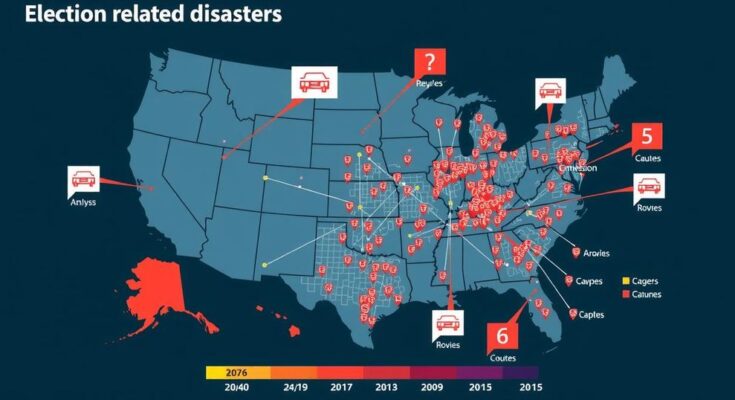Extreme weather events during the 2024 Election Supercycle significantly disrupted electoral processes across 14 countries, exacerbated by climate change. Key disruptions occurred in Tuvalu, India, Austria, Mexico, and the United States, affecting voter turnout and electoral integrity. The Election Emergency and Crisis Monitor by International IDEA serves as a critical tool for understanding and addressing these challenges.
The 2024 Election Supercycle faced significant disruptions due to extreme weather events impacting national and subnational elections across 14 countries, including Bosnia & Herzegovina, India, Mexico, Senegal, Tuvalu, and the United States. Climate change exacerbated these incidents, hindering various electoral processes such as voter registration, campaigning, voting operations, and result announcements. Notably, in Tuvalu, severe storms delayed the new Prime Minister’s election, while extreme heat in India resulted in casualties during the largest-ever election. Furthermore, adverse weather conditions affected the voting in Austria and Mexico, while hurricanes in the U.S. claimed numerous lives and postponed local elections in Bosnia & Herzegovina. The Election Emergency and Crisis Monitor (EECM) by International IDEA highlights these electoral challenges globally, showcasing the impacts of various disasters on elections and offering comprehensive resources for stakeholders involved in the electoral process.
The background of the article centers on the intersection of climate change and electoral integrity. As extreme weather events become increasingly frequent and severe, their impacts on elections worldwide present significant challenges. The 2024 Election Supercycle is a compelling case study illustrating how diverse weather phenomena disrupt electoral processes in various contexts, prompting a need for adaptive measures and resilience planning in future elections. International IDEA’s EECM serves as a crucial tool for monitoring these disasters and their implications for democratic participation.
In summary, the 2024 Election Supercycle exemplifies the profound impact of climate change on democratic processes worldwide. As extreme weather events affect voter turnout and electoral integrity, it is imperative for election stakeholders to prioritize disaster preparedness and mitigation measures. The EECM provides vital insights and resources, enabling countries to address and adapt to these emerging challenges in the electoral landscape.
Original Source: www.idea.int




